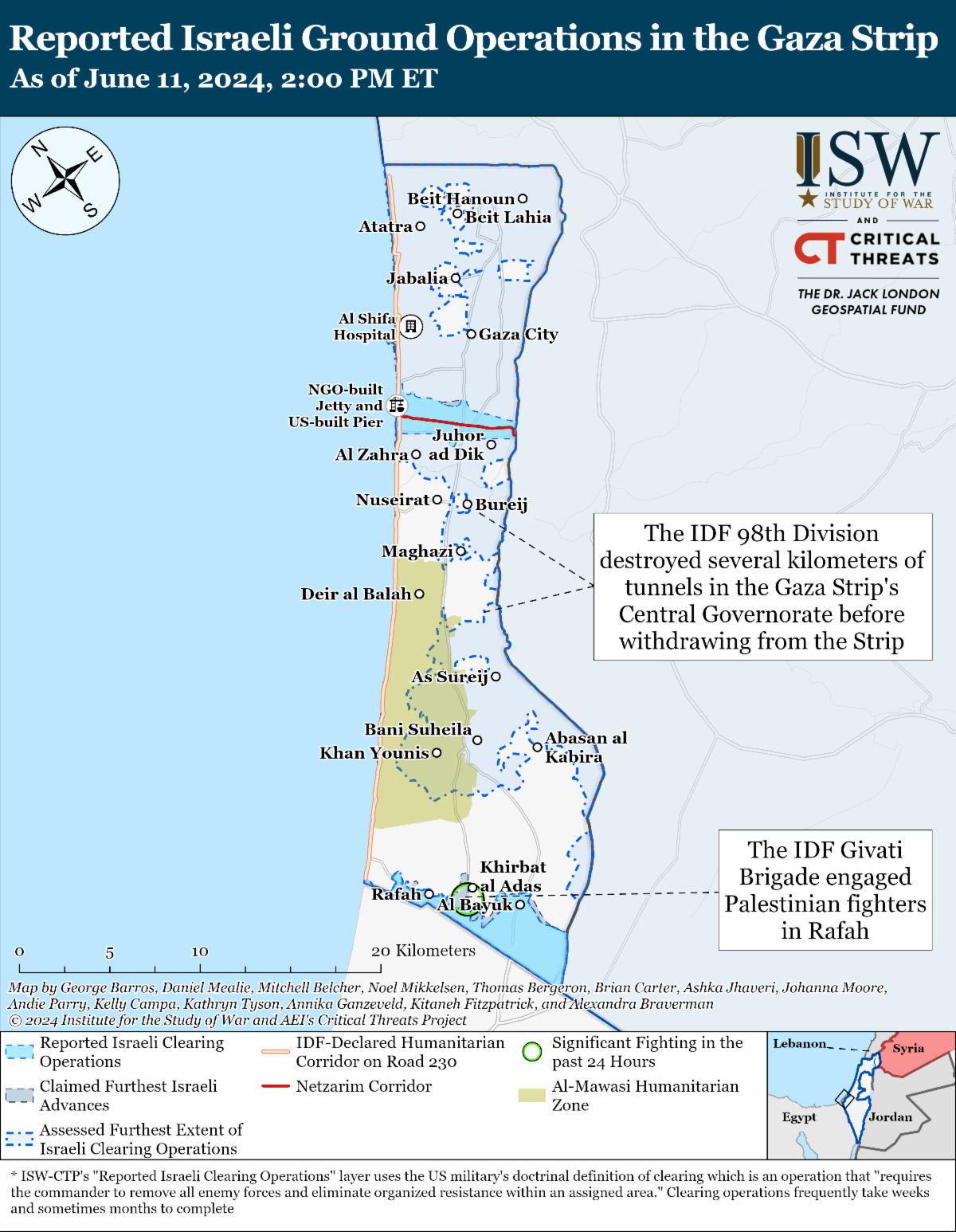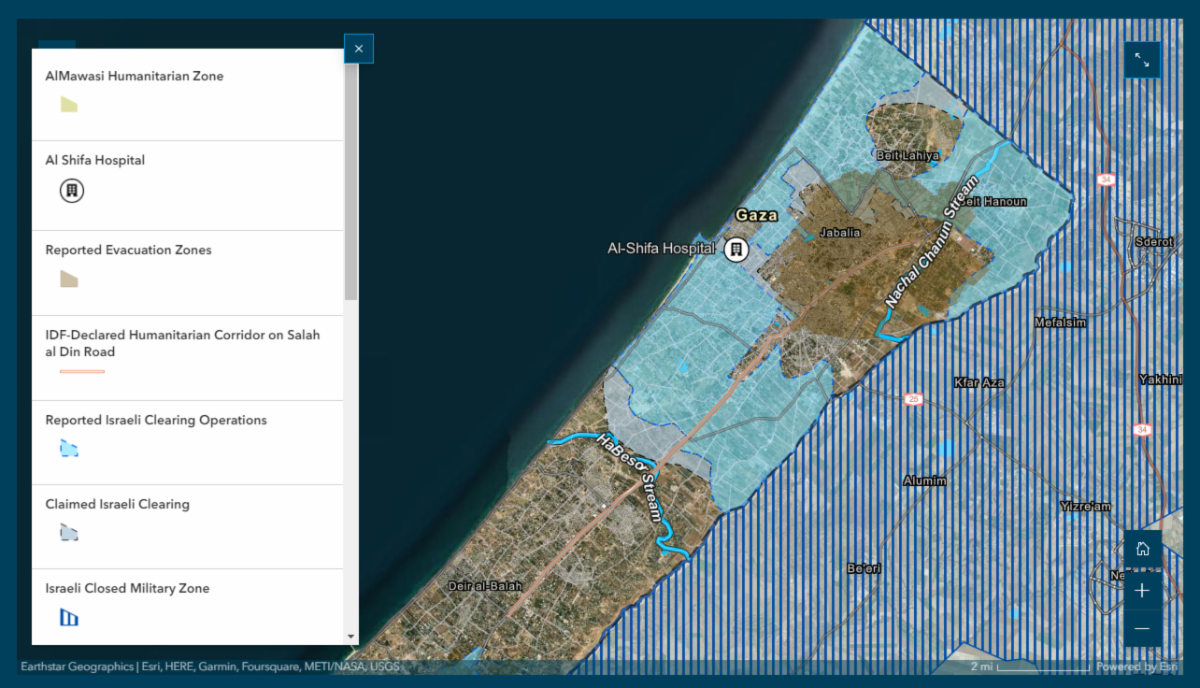Hamas sent a formal response to the Israeli ceasefire proposal to international mediators on June 11. Hamas and the Palestinian Islamic Jihad expressed “readiness to positively” engage in a deal, emphasizing Hamas’ primary demand for a permanent ceasefire. Hamas Political Bureau Chairman Ismail Haniyeh and Palestinian Islamic Jihad Secretary General Ziad al Nakhalah gave the response to the Qatari prime minister. Qatar and Egypt confirmed receipt of the Hamas response and said that they would review it and coordinate the next steps. Hamas Political Bureau member Osama Hamdan told Lebanese Hezbollah-affiliated media that Hamas left comments on the latest ceasefire proposal. The comments include descriptions of the ceasefire and demands for Israeli withdrawals from the Rafah crossing and Philadelphi Corridor. Hamdan added that all Palestinian factions share Hamas’ position. Hamas has been reviewing an Israeli-accepted, US-drafted proposal since May 30. Several Hamas officials have indicated opposition to the Israeli ceasefire proposal, arguing that Hamas will only accept a proposal that guarantees a permanent ceasefire. A permanent ceasefire is one of the maximalist demands that Hamas has maintained since December 2023.
The United Nations Security Council (UNSC) adopted a resolution on June 10 that called on Hamas to accept the latest ceasefire proposal. The United States presented the resolution as part of several other diplomatic efforts to increase international pressure on Hamas to accept the proposal. The resolution detailed the three phases of the ceasefire proposal and stressed that a ceasefire would continue even after the initial 42-day period of the first phase if negotiations for phase two are ongoing. Hamas has expressed concern that the proposal does not ensure a permanent end to hostilities. A senior Hamas official told Reuters on June 11 that it accepts the UNSC resolution and is ready to negotiate over the details. US Secretary of State Antony Blinken said Hamas' response is "hopeful,” but noted that Hamas’ leadership in the Gaza Strip will be the one to make final decisions.
Hamas leader in the Gaza Strip Yahya Sinwar remains confident in Hamas’ position in the Gaza Strip and believes that Israel has “more to lose” than Hamas. Sinwar recently told mediators that, “[Hamas] has the Israelis exactly where [Hamas] wants them.” Sinwar believes that Israel has more to lose from the war than Hamas does, and that Hamas can continue the fight in the Gaza Strip. Sinwar’s confidence is reflected in Hamas’ insistence on its maximalist demands during negotiations since December 2023. Hamas likely remains confident that it will survive Israeli military operations in the Gaza Strip and can therefore maintain its maximalist demands without granting major concessions.
US Secretary of State Antony Blinken met with several regional leaders in the Middle East on June 10 and June 11 to discuss the need to secure a ceasefire in the Gaza Strip. Blinken met with Israeli Prime Minister Benjamin Netanyahu and other senior Israeli officials in Israel on June 10 in a series of separate meetings. Blinken said that there is “strong consensus” in Israel and internationally to move forward with the proposal and “everyone’s vote is in, except one vote and that’s Hamas.” Blinken said that “it really is down to one person at this point,” referring to Sinwar.
Key Takeaways: - Gaza Strip Ceasefire: Hamas sent a formal response to the Israeli ceasefire proposal to international mediators on June 11, but the full response has not yet been released. A senior Hamas member told Hezbollah-affiliated media that Hamas left comments on the proposal including descriptions of the ceasefire and demands for Israeli withdrawals from the Rafah crossing and Philadelphi Corridor.
- Hamas Ceasefire Calculations: Hamas leader in the Gaza Strip Yahya Sinwar remains confident in Hamas’ position in the Gaza Strip and believes that Israel has “more to lose” than Hamas. Sinwar analogized himself to Imam Hussein in a statement to unspecified allies. Hussein was a major figure in Islamic history who fought and died against a much larger army at Karbala in 680 CE.
- Iranian Presidential Elections: Iranian reformist presidential candidate Masoud Pezeshkian is trying to balance his relatively moderate agenda with his need to maintain the approval of the Iranian supreme leader. Most—if not all—actors in the Iranian political spectrum are ultimately dedicated to preserving the Islamic Republic and serving its supreme leader.
- Iranian Presidential Disqualifications: UK-based outlet Amwaj Media reported that multiple regime officials worked to disqualify prominent moderate Iranian politician Ali Larijani from the 2021 presidential elections.
- Iraq and Syria: An Iranian-backed Iraqi militia claimed that unidentified fighters fired rockets at US forces in northeastern Syria on June 11. This group previously claimed that unidentified fighters targeted US forces in northeastern Syria in March 2024, but CENTCOM did not confirm that attack. There is no evidence that either the June 11 or March 2024 attacks actually occurred.
- Yemen: CNN reported on June 11 that US intelligence learned that Houthis are in talks to provide weapons to Somalia-based Sunni militant group al Shabaab, citing three anonymous US officials.
| 






 [ISW] 러시아 공세 캠페인 평가, 2024년 6월 12일
[ISW] 러시아 공세 캠페인 평가, 2024년 6월 12일
 [ISW] 러시아 공세 캠페인 평가, 2024년 6월 11일
[ISW] 러시아 공세 캠페인 평가, 2024년 6월 11일